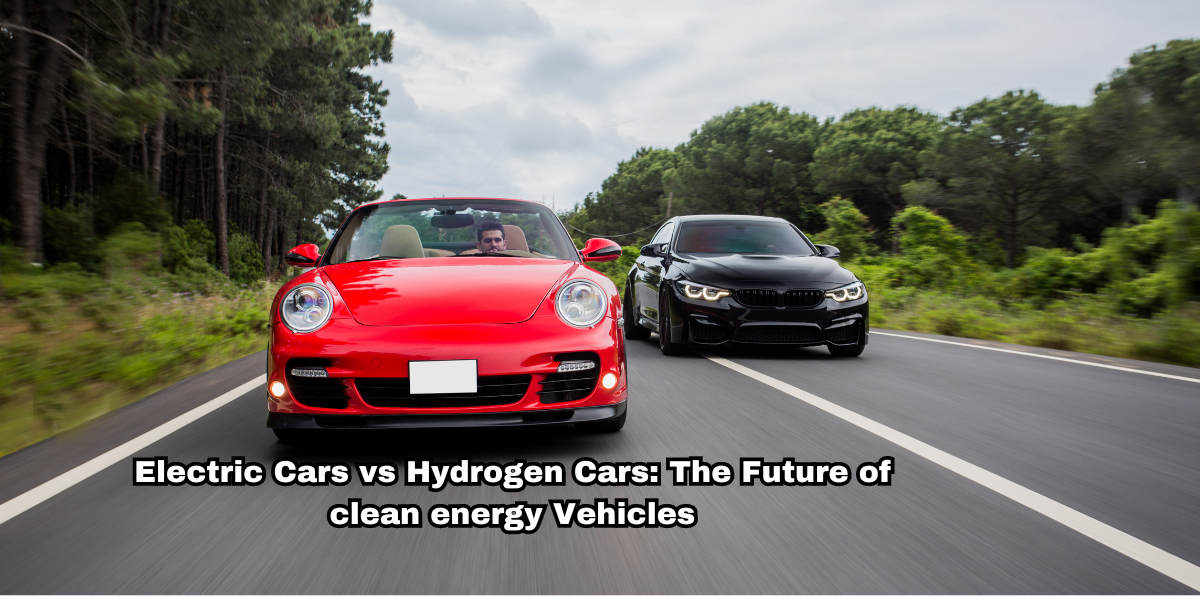Today, people are turning from using conventional fuel guzzling and emissions-producing gasoline and diesel automobiles in the fight against global warming. With this change, clean energy vehicles have become more popular, and two technologies are leading the way: for instance, electric-driven cars and hydrogen-driven cars. Each has its particular strength and weakness; to argue which is the transport system of the future is not possible as all of them have their own advantages and disadvantages [7]. In this article, you will learn what electric cars are and what pulses are inherent in them, as well as what negatives can be expected when the cars become widespread and familiar years of beloved hydrogen cars.
What Are Electric Cars and Hydrogen Cars?
Electric cars (EVs)
Electric cars are cars that use electrical batteries in order to store energy. They also have wheels for locomotion and operate with electricity; you recharge them, just like a phone. Unfortunately, some of the well-known automakers, such as Tesla, Nissan, and BMW, manufacture electric cars.
Hydrogen cars (FCEVs)
Fuel cell cars, also referred to as hydrogen cars, rely on hydrogen for their operation. Naturally, if the motor was charged through the fuel cell, then the hydrogen must pass through some kind of chemical process in the fuel cell in order to generate electricity. Presently, hydrogen car makers are a number of automobile firms, including Toyota and Hyundai.
How Do Electric and Hydrogen Cars Work?
Indeed, electric cars are very simple in how they operate. They come with sockets into which you connect them, charge up the battery, and the stored energy is what will make you travel. As compared to traditional gasoline cars, they possess a reduced number of parts that work, thus requiring minimal attention when it comes to fixing.
Hydrogen cars, on the other hand, function somewhat differently from how those mentioned earlier operate. They utilize hydrogen gas stored in a tank, mixing it with oxygen from the main environment in the fuel cell. This leads to generation of electricity, which drives the motor, and there will be production of water as a waste product, which is brought out by the exhaust.
Advantages of Electric Cars
1.Zero Emissions:
Early electric cars in our current context did not emit any emissions from the tailpipe. This means that they discharge no poisonous gasses, hence a very environmentally friendly car.
- Easy to Charge at Home
One of the biggest advantages of electric cars is that you can easily charge them at home overnight. Many EV owners simply plug in their car in the evening and have it fully charged by the morning.
3.Simple Maintenance:
Electric vehicles have fewer moving parts than gasoline or hydrogen cars. There are no oil changes, and the electric motor is much simpler, leading to lower maintenance costs.
- Growing Charging Network:
Drive-through fast food restaurants are ever popular today. Today, there are quite many public charging stations, which means that one can easily cover long distances in an EV if he/she is in an urban center.
Disadvantages of Electric Cars
1.Long Charging Times:
Charging an electric vehicle takes longer compared to filling up a gasoline or hydrogen car. Fast charging options are available, but they still take more time than a typical refueling stop.
2.Limited Range:
While newer electric cars have improved their range, some EVs still have a limited distance they can travel before they need to be recharged. This can be challenging for long road trips.
3.Battery Issues:
Batteries degrade over time, which means the range can reduce as the car gets older. Also, battery production is resource-intensive, raising concerns about environmental impact.
Advantages of Hydrogen Cars
1. Fast Refueling:
One of the main benefits of hydrogen cars is the quick refueling time. Filling a hydrogen tank is very similar to filling a gas tank, taking only about 3-5 minutes.
2. Longer Range:
Hydrogen cars generally have a longer range compared to many electric vehicles. This means fewer stops during long drives, which can be more convenient for those who need to travel long distances regularly.
3.Zero Emissions:
Like electric cars, hydrogen cars produce zero harmful emissions. The only thing they emit is water vapor, making them an environmentally friendly option.
Disadvantages of Hydrogen Cars
1.Limited Infrastructure:
Hydrogen refueling stations are not as common as electric charging stations. In most areas, finding a hydrogen station can be challenging, limiting the practicality of hydrogen cars.
2.Complex Production Process:
Hydrogen fuel is not as easily produced as electricity. It requires a lot of energy to extract, often from natural gas, which raises concerns about its overall environmental impact.
3.Higher Cost:
Hydrogen cars are more costly to own than electric cars because the technology behind hydrogen cars remains young and expensive.
And Which of the Two Would Be the Future of Clean Energy Vehicles?
Determining which of those now-ubiquitous clean energy vehicles is the future is just a matter of technology, infrastructure, and preference.
Electric Cars Are Leading the Way Right Now:
Self-powered cars have been available for a longer period than hybrids, so the charging stations’ network is growing very fast. This makes the application of EVs less of a challenge to the normal consumer.
Manufacturers of automobiles are also dedicating most of their capital to battery technology, thus lowering the cost of electric cars and at the same time extending the driving distances substantially.
Hydrogen Cars Have Potential for the Future:
Currently, hydrogen cars have some ways to go, but there are enormous opportunities, especially within the fleet market containing buses and trucks. For this reason, they are seen as a solution to heavy hauling and long-distance transportation that demands the least time to be off task due to refueling.
However, the main constraint still persists, which is the inadequate establishment of hydrogen refueling stations, and again, the cost of manufacturing needs to be reduced for consideration of the hydrogen cars.
Electric vs. Hydrogen: Key Comparisons
| Feature | Electric cars (EVs) | Hydrogen cars (FCEVs) |
| Refueling Time | Long (30 minutes to several hours) | Short (3-5 minutes) |
| Range | Limited, but improving | Generally longer |
| Infrastructure | Well-developed and growing | Limited and still in early stages |
| Cost | Becoming more affordable | Expensive due to new technology |
| Environmental Impact | Zero emissions, but battery issues | Zero emissions, but production issues |
Which One Should You Choose?
For City Drivers:
If you mostly drive around the city, an electric car may be the better choice. It is easy to charge overnight at home, and the growing number of charging stations makes it convenient for city commutes.
For Long-Distance Travelers:
If you frequently drive long distances, hydrogen cars may be more suitable, provided there are refueling stations along your route. The quick refueling time and longer range make hydrogen cars a promising option for road trips.
For the environmentally conscious:
Both types of cars have their environmental pros and cons. Electric cars have zero emissions but face issues with battery disposal and resource extraction. Hydrogen cars emit only water vapor but require energy-intensive production. In the long run, advancements in renewable energy and hydrogen production could make both options greener.
Conclusion: A Combined Future
Though electric cars are the current advocates for clean energy vehicles today, hydrogen cars also have their own significance that may turn into more important.
not in the future. The harsh truth is that electric and hydrogen cars are needed to work and be part of the effort that society needs to minimize emissions and fight climate change.
At the moment, electric cars are expected to be the most popular in everyday use as they are already supported by a developed system and are cheaper than their counterparts. Still, hydrogen cars may have their market, namely, the segment of heavy vehicles where fast refilling and great range are needed.
One can also presume that both technologies will remain in use and will expand the spectrum of available solutions, respectively, to different types of drivers and requirements in transport. Built on this foundation, we look forward to even better and more sustainable clean energy vehicles as we proceed into the future years.

